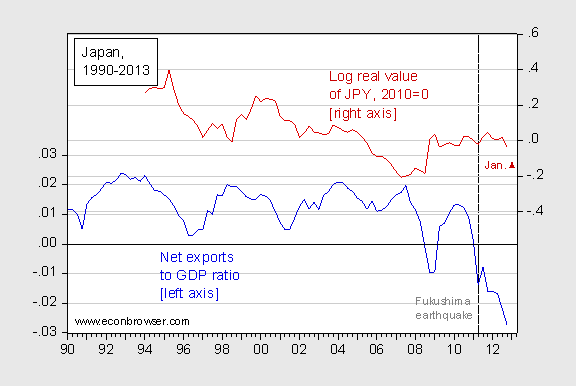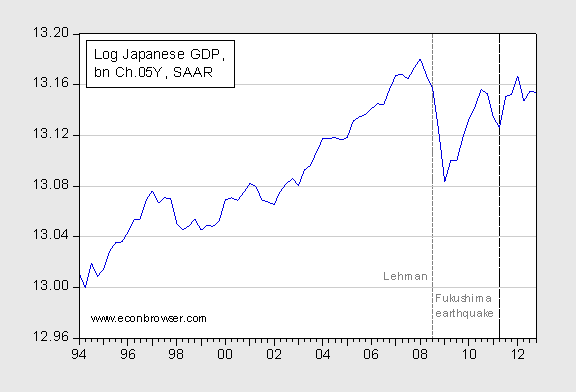With Haruhiko Kuroda ascending to head the Bank of Japan [1], it is likely that monetary policy will remain fairly expansionary. Even without direct intervention in foreign exchange markets, the yen will likely continue to weaken as expectations of inflation rise. What is the likely impact of trade flows?
Figure 1 depicts the Japanese net exports to GDP ratio and the real value of the yen.

Figure 1: Net exports to GDP ratio (blue, left axis), log real trade weighted value of the yen against a broad basket of currencies (red, right axis); January value for 2013Q1. Source: IMF, IFS,Japan Cabinet Office ESRI, and BIS.
While net exports are clearly declining, it’s important to keep in mind that Japanese GDP is also declining, from already low levels.

Figure 2: Log real GDP in Ch.2005¥ (blue). Source: OECD via FRED, Japan Cabinet Office ESRI.
Hence the stakes are high. An expansionary monetary policy (as described in this post) can affect output by way of reducing real debt loads, and relaxing collateral constraints in financial accelerator model, as well as other channels. Those channels are in addition to the exchange rate channel that most are focused on.
Obviously, for an open economy, that exchange rate channel is important. And over the past few months, the yen has indeed depreciated precipitously. The January value is about 20% weaker than that recorded in 2011Q4. What does this imply for Japanese net exports? Relative to baseline one needs to know the price elasticity of imports and exports. Crane, Crowley and Quayyum (2007) find (for the period up to 2006) that the import elasticity with respect to relative price is near zero, while the export elasticity with respect to the real effective exchange rate is about 0.34.
Willem Thorbecke has recently estimated elasticities for Japanese exports. He finds that for a sample starting in 1990, the elasticity ranges between 0.44 to 0.61 (midpoint about 0.5). 2012Q4 real exports was 77,495.7 bn Ch.05Yen. That means a 20% depreciation, if sustained, should result in about 7,750 bn. Ch.05Yen increase in real exports; this is about a 1.5% of 2012Q4 GDP. That back-of-the-envelope calculation pertains to the long run; after two years, any deviation is reduced to about 10% of the original amount.
For more on the economists (and others) behind Abenomics, see this article.
Energy Statistics and Healthcare; Egalitarianism and Conservatism
I was invited to give a luncheon speech yesterday at the EIA on supply-constrained forecasting. About 30 of their analysts and management attended–it was a good crowd, very much with a family feel.
The EIA, like other government entities, will be affected by the sequester, risking provision of energy data. The funding necessary to insure this data would probably be the equivalent of the cancer treatment costs of half a dozen octogenerians.
Thus, the provision of data for the nation–indeed, for the world–is endangered by the desire to extend the lives of a very few people for a relatively short time.
I think this trade-off highlights some important differences between conservative and egalitarian thinking. In conservative thinking, the unit of analysis is the group, not the individual. No one knows who will be the specific user of EIA data, if it will be used now or in the future, or whether any specific data item will be used at all. But the nation as a whole needs data in order to support its decision-making.
Egalitarian policies, by contrast, tend to result in benefits to identifiable persons. Healthcare benefits are extended to specific individuals, not the community as a whole. Those six octogenerians can be identified by name, and the sums each has drawn can be known to the penny.
To deprive those individuals of care is heartless, if the unit of analysis is the individual themselves. It is very difficult for politicians, who depend on popularity, to be heartless.
But the cost is then borne by the group as a whole, and a relatively short term gain to a small group of individuals is undermining the larger interest of the group as a whole. The conservative is called to defend the interest of the group but will receive no honor or credit for doing so. That’s the way it is.
And that’s what the sequester is about, too.
Menzi,
Can you please clarify Abe’s position on fiscal stimulus and how you think it will help boost growth (and inflation?)
1. Those graphs do a nice job of conveying why Abe is doing what he’s doing. Thanks.
2. Steven, what nonsense! You can phrase stuff all day long about how you think the world breaks down but it’s not real. If anything, for example, conservatives favor the individual and the rights of the individual over the rights of the group. Except on specific moral issues, mostly pertaining to religious beliefs, where conservative believe the group has the right to impose behavior on individuals. Liberals are known more for thinking of aggregates, as in some gun control laws are necessary even though they restrict some specific individual’s wants because certain uses of guns pose a real danger to the group.
Say you had a bunch of old people on an island. We’ll call it “Japan.” Old people produce less. As they get older, they produce even less. GDP is shrinking so you have this brilliant idea to take their currency and print a bunch of it to devalue it. This has the subtle effect of reducing their pay for working. So with lower incentive to work due to lower wages for work, and lower output due to simply aging, GDP keeps shrinking. Brilliant economists say “JUST DEPRECIATE MORE!” but alas, nothing can stop the implosion of “Japan.”
Menzie wrote:
With Haruhiko Kuroda ascending to head the Bank of Japan [1], it is likely that monetary policy will remain fairly expansionary. Even without direct intervention in foreign exchange markets, the yen will likely continue to weaken as expectations of inflation rise. What is the likely impact of trade flows?
This is a great observation and question and the paragraph answers itself. If monetary policy does not change then the impact of monetary policy on Japan’s economy will not change. What you see is what you get. If there is any evidence of the complete failure of monetary expansion on economic stagnation Japan must be at the top of the pile.
Thanks Menzie.
Also, even if this boosts GDP by 1.5%, this isn’t enough to save Japan. It won’t boost GDP by 1.5% because the population from 1990 to 2012 where the sample is pulled from is a population of middleaged people in their working years. Now Japan is OLD and getting OLDER and you just can’t force old people to produce, no matter how you manipulate your fiscal and monetary policy.
I meant “conservative” as a philosophical matter, not conservatives as a political party.
Principal-agent theory tells us that the individual is always torn between duty (the role assumed) and individual desires. Moreover, a person in a position of power is able to subvert the system to benefit themselves–a primary complaint of egalitarians.
Having said that, it’s quite popular to give health care to the elderly, a different matter to champion statistics gathering. That’s why healthcare spending is out of control and US infrastructure is thought to be in comparatively poor shape.
But this is a longer topic for another time.
Steven, if that is the way you want to organize the world, fine but I can list examples that show conservative philosophy acting in the opposite way, as I can show liberal philosophy acting on the individual.
OMG Jonathan!!! Are you crazy, everybody knows that the other side is completely wrong without exception.